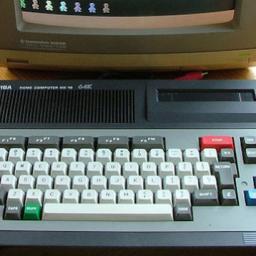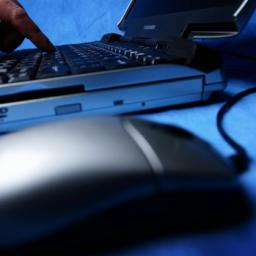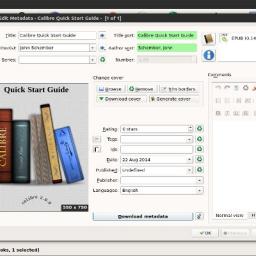
As a writer and avid reader, I find the Calibre ebook manager/editor invaluable. Not only does it allow you to produce, fix, or edit ebooks, but it's a good ebook reader app on its own if all you want to do is read an EPUB on your computer. When I wrote and published
The Dictator's Handbook, Calibre played
an important part of my workflow as I took LaTeX source code and turned it into an epub.And it's just gotten better. Version 2.0 is out, with huge improvements and additions in functionality.
According to the changelog, Calibre now has an e-book editor capable of editing books in the EPUB and AZW3 (Kindle) formats, with many powerful tools and features specially designed for making editing e-books easier, users now have the ability to compare books, which allows them to see all the differences between two books, highlighted, side-by-side, and it's now possible to connect to any Android phone or tablet on OS X and the application should automatically detect and connect to it.
It's worth noting that Calibre has also switched to Qt 5, which means that the interface should look a lot more modern and it should integrate much better with the operating system. Also, a number of improvements have been added to the way the library is now organized, which should make the entire experience much more streamlined.
Last I checked, it runs on just about every major desktop OS platform. I run it on FreeBSD and Linux.
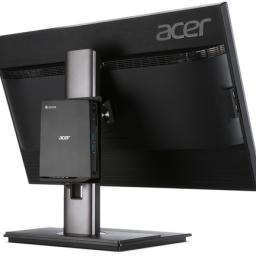
You may not be a big fan of ChromeOS but there's no denying that Chromeboxes on low-spec hardware make it easy to easy to get on line and access web services. And
Acer's hoping that's a market with room to grow.Acer's Chromebox CXI, announced on Thursday (and pictured mounted on a separate Acer monitor above), puts the Chrome OS into a small enclosure measuring 0.6 liters in volume. It runs an Intel Celeron 2957U dual-core 1.4GHz processor, has a 16GB solid-state drive, and promises a boot-up time of just 8 seconds.
The device can include up to 4GB in RAM, has four USB 3.0 ports, an SD card reader, LAN port for wired network connection, and HDMI and DisplayPort outputs. It's priced from $179.99, including a keyboard and mouse.
Also covered by Engadget.
[Ed. note: I think I want one of these babies, but I'm hoping they'll allow newer versions of ChromeOS to access network shares first, since that's where I've put all my stuff.]
Thought we'd do another, short poll in mid-week, and I was curious which time zones we're all in. I am noticing a lot of comments come at about the same time in the 24 hour cycle, and I'm wondering if a lot of us are clustered in the same time zone.
This is in no way intended to infringe on your privacy. You anonymous cowards are welcome to remain anonymous and keep me guessing. And so is everyone else! But it does help give a sense of how early you have to get up around here in order to post an article 'first thing in the morning.'
Cast your vote here.
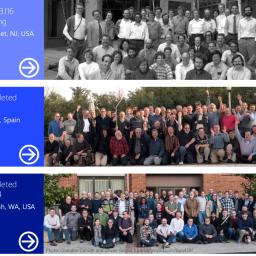
Herb Sutter reports that the ballot closed on Friday. From the
announcement: "We will perform some final editorial tweaks, on the
order of fixing a few spelling typos and accidentally dropped words,
and then transmit the document to ISO for publication this year as the
brand new International Standard ISO/IEC 14882:2014(E) Programming
Language C++, a.k.a. C++14."
https://isocpp.org/blog/2014/08/we-have-cpp14There's been a rash of big companies buying small companies to fill out their portfolios, retain customers, provide new services, shift their focus, or for who-knows-what-reason. Apple's multi-billion dollar purchase of the Beats headphone company is the one that's made the biggest splash, but Facebook's purchase of WhatsApp has been both praised and denigrated.
Thinking value-for-money here, which purchase do you think was the best strategic move?
Cast your ballot here.

Two interesting articles showed up in my RSS feed today, that juxtaposed, make for an interesting discussion. First,
Business Insider has provocatively written that Android is definitively the OS for poor people, and iOS for the rich. They've got some data that shows that people of higher income brackets overwhelmingly use iphones, while Android devices are used by the brackets with less disposable income. But at the same time,
they've posted a good article showing a list of eight things the iphone can't - and probably will never - do. They include external storage, NFC support, USB connectors, and a couple of others [all one one page, not eight clicks: thank you!]
So is Android destined to be the poor man's iphone, or is it the ecosystem busy pushing the boundaries of technology and function? Because the days of claiming Android is simply catching up to Apple seem to be long behind us.
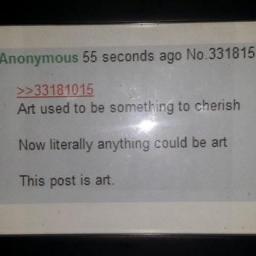
What is art? Depends on who you ask. But according to anonymous over 4chan, "Art used to something you cherish. Now literally anything is art. This post is art." Precient! Because
a screenshot - flash glare and all - of that post has just been sold on an ebay art market for over ninety thousand dollars.
An eBay auction for "Artwork by Anonymous," which is a 4chan screenshot printed out on regular printer paper (pictured above), sold this weekend for $90,900 after 45 bids. The piece, if we're really going to take this seriously, asks you to consider whether or not society has an eroded definition of what we cherish as art. Looking at this auction, we're thinking it does.
This is the entire product description:
"This auction is for a One of a Kind work of art by Anonymous. This work is untitled. This item will be shipped in a frame for convenience.
If you think about it, it's a pretty great deal, since that convenient frame was thrown in for free.
A+++, would buy again. As a writer and avid reader, I find the Calibre ebook manager/editor invaluable. Not only does it allow you to produce, fix, or edit ebooks, but it's a good ebook reader app on its own if all you want to do is read an EPUB on your computer. When I wrote and published The Dictator's Handbook, Calibre played an important part of my workflow as I took LaTeX source code and turned it into an epub.
As a writer and avid reader, I find the Calibre ebook manager/editor invaluable. Not only does it allow you to produce, fix, or edit ebooks, but it's a good ebook reader app on its own if all you want to do is read an EPUB on your computer. When I wrote and published The Dictator's Handbook, Calibre played an important part of my workflow as I took LaTeX source code and turned it into an epub.
